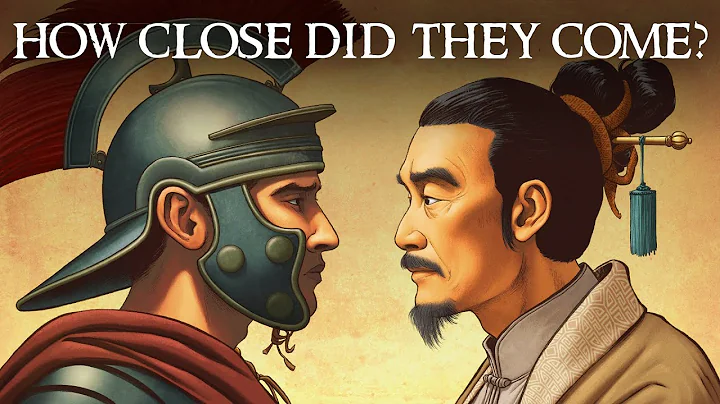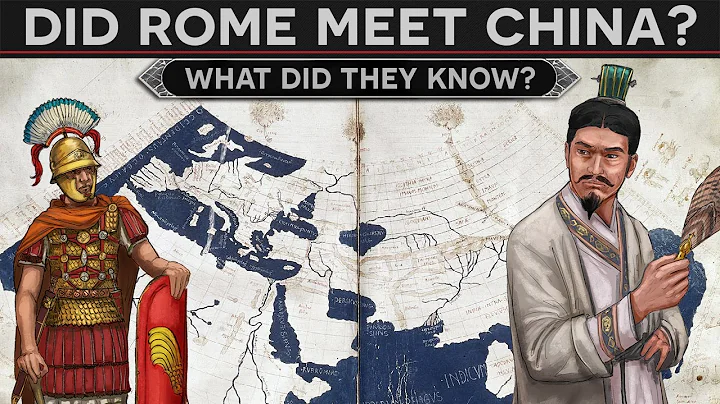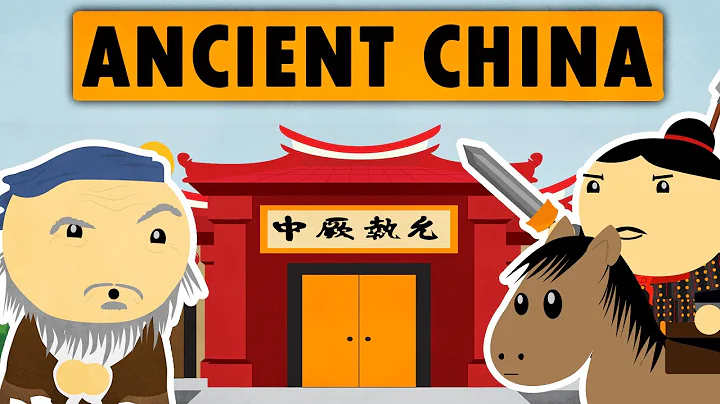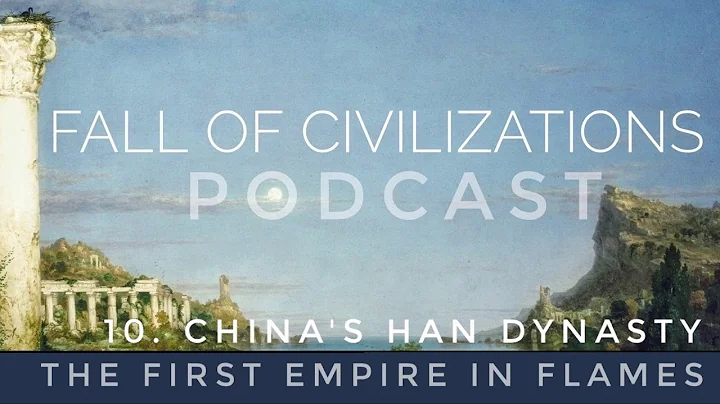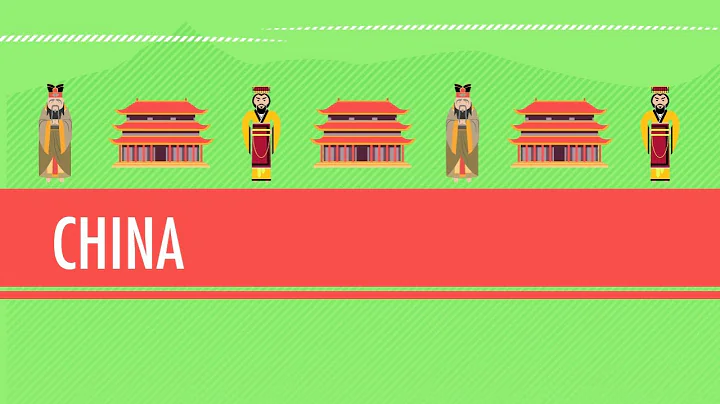In 141 BC, sixteen-year-old Liu Che succeeded to the throne. Before that, the Han Empire had existed for more than sixty years. Due to the short lifespan of human beings at that time, sixty years was long enough for the people of the world, and it had already gone through several generations. The lack of popularization of writing also made people People have become forgetful and have forgotten the wars, killings, poverty, and hunger 60 years ago. Under the unified empire, people lived a prosperous and leisurely life.
With the death of the last Empress Dowager Dou who insisted on the Huang-Lao method of governing the country, the Han Empire's sixty-year mythical era of inaction came to an end, and the empire's engine suddenly turned.

Stills of Emperor Wu of Han
As unified became more and more popular, the central government began to centralize power. When power is concentrated and national wealth is accumulated to a certain extent, an era of "the rise of a great power" is about to begin. This era no longer needs the frugality of walking on thin ice at the beginning of the founding of the country. What is needed is the heroism to concentrate on doing big things, and a hawkish emperor and a group of hawkish ministers decided to do their big things. They want to use war to wash away the shame of 60 years of groveling against the Huns, and they want the "Han" flag to fly to the end of the world.
His fame was immediately taken from
In 127 BC, the Han army achieved its first large-scale victory over the Xiongnu. Wei Qing swept the Hetao area and beheaded nearly five thousand people. Emperor Wu of the Han Dynasty was overjoyed. Wei Qing was granted the title of Changping Marquis and granted 3,800 households. This meant that the Han Empire had to separate 3,800 households to support Wei Qing. If we count three people per household, we can almost say that every time Wei Qing's army beheaded a head, the Han Dynasty allocated two people to support Wei Qing.

In the Han-Hungarian war of this era, the Han people’s butcher knife was aimed at all Huns, which means that nearly half of the beheadings in each battle were Xiongnu civilians, and such reward standards meant that for every Xiongnu person who disappeared, the Han Empire’s Two people will disappear from the national finances. And this is just a reward for the general. Behind it are rewards for the army, compensation for casualties and financial consumption during the war that exceeds ten times during peacetime. What an expensive war!
In this era of killing for glory, Emperor Wu of the Han Dynasty gave enough respect to the soldiers, because Emperor Wu of the Han Dynasty needed iron-blooded soldiers to wash away the empire's previous shame. So how much did the war consume the empire's finances?
War Financial Trap
War, especially a war between irreconcilable ethnic conflicts, once started, must end with the demise of one side. This was destined to be a cruel war of attrition. The Han and Hungarian sides used population, resources, and wealth as consumables to launch a fateful battle.
While the Xiongnu suffered a fatal blow, the Han Empire also suffered huge losses. Since most of Wei Huo's battles against the Xiongnu were leaps forward thousands of miles away from the mainland, the Han army's battle loss ratio exceeded 30%. However, there was no shortage in the population. The key was the loss of war horses. Take the battle of Huo Qubing Feng Langju Xu as an example. The Han army used 140,000 horses, but less than 30,000 came back alive.
Behind the glory brought by the war, there is a bottomless pit trap. The Han Dynasty has occupied the most valuable land in East Asia, and the war can no longer bring valuable practical benefits to the empire. Under such circumstances, the financial figures directly reflected in the war gains are almost negligible, but the heroic rise of a great power brought about by the war stimulates the emperors and ministers of the empire like a stimulant. Emperor Wu of the Han Dynasty reigned for fifty-four years, and the war lasted for forty-four years, almost every year without fighting. Faced with such terrible consumption, how did Emperor Wu of the Han Dynasty gather the power of the world to support it?
The world supplies weapons
The war that lasted for decades created an era at the peak of military affairs, and the huge financial pressure forced an era that was best at amassing money. Emperor Wu of the Han Dynasty's financial strategy was a temporary plan formulated for the war. Strategies, but because these strategies have a huge promotion effect on centralization, most of these temporary measures have been passed down forever, and the core parts are still in use in modern times.These measures are large and complex. Here I have summarized the three most fundamental ones:
First, the era of state-owned enterprises
In China’s previous thousand-year history, there were almost no dedicated fiscal policies except normal taxation. The birth of state-owned enterprises changed everything. It all started with a minister named Sang Hongyang, who together with Emperor Wu of the Han Dynasty formulated a plan for China to last forever - salt and iron monopoly.
Before Emperor Wu of the Han Dynasty, the Han Dynasty adopted the policy of governing by doing nothing and adopted a policy of great openness in the economy, that is, the government interfered little or even not at all. This was an era of completely liberalized competition, and the great unification provided by the country The market is naturally suitable for the development of commerce, so a large number of business families have been born, such as the Sichuan Zhuo family and the Nanyang Kong family in iron smelting. In the free market, these families continue to improve productivity and production quality in order to compete in the market.

Enlightenment of Chinese State-owned Enterprises - On Salt and Iron
And now Emperor Wu of the Han Dynasty's salt and iron monopoly is to deprive this group of people of their core interests. It must be said that Emperor Wu of the Han Dynasty was a broad-minded monarch. He did not raise the butcher's knife against these families. Instead, they were brought in and a model similar to modern government-enterprise cooperation was established, in which the government issued policies and established a strong monopoly, and enterprises contributed money and efforts. This mutually beneficial model of cooperation smoothly and quickly realized the state-owned enterprise plan of Emperor Wu of the Han Dynasty.
Of course, there is no perfect plan in the world, only temporary perfection. Salt and iron benefit the country and the family, but it is only detrimental to the people. However, in the relatively wealthy Emperor Wu Dynasty, this hidden danger was hidden, and the people who were good at accepting things quickly adapted. Although there are some complaints about this system, it does not affect the overall situation. But at the end of the dynasty, when people's livelihood was declining, the unfairness caused by this policy was infinitely magnified. You have never seen how many rebels the private salt dealers contributed. And those big families who joined the management of state-owned enterprises slowly realized the identity of government and businessmen, and they, who were powerful and wealthy, became the famous vampires in the Han Dynasty - Hao Qiang. During the Three Kingdoms era at the end of the Eastern Han Dynasty, these powerful powers became independent political forces and stepped onto the world stage.
Second, the agricultural taxation of the blood-drawing industry and commerce
in the Han Empire has always been at a low level in Chinese history, and it adopted a system of one tax per thirty. This was because low agricultural productivity at that time led to low yields per mu, and excessively high taxes made it impossible for farmers to support themselves. However, low agricultural taxes did not mean that farmers had a light burden.
Emperor Wu of the Han Dynasty maintained low agricultural taxes to ensure the stability of farmers. At the same time, he imposed heavy taxes on other aspects, such as state-owned enterprise income, customs market income, etc., which would be indirectly passed on to farmers. However, compared with agricultural taxes, this method It is much more concealed and can cover up most people’s dissatisfaction.

This strategy was also widely used in later generations, but this strategy had a core flaw, that is, it was too severe on industry and commerce, which caused the inability to fully develop China's industry and commerce. This suppression in the Song Dynasty It reached its peak because the Song Dynasty redundant soldiers and officials and the financial burden was heavier. This is why China still had four major inventions of "intelligent manufacturing" before the Song Dynasty, but it became a manufacturing country after the Song Dynasty. This is also why China became a manufacturing country. The foundation of agricultural society for thousands of years.
In modern times, our industry and commerce still bear the bulk of the country's tax revenue, but rapid productivity has caused industrial and commercial profits to skyrocket, and the pressure of taxes has been offset by high profits. Our country's industry and commerce has finally entered the most beautiful era.
Third, the nationalization of coinage
In China before Emperor Wu of the Han Dynasty, Chinese currency was rarely in a state of free competition, that is, anyone could mint coins, and the circulation of currency was determined by the market. Good coins are used more and more widely in the market, while and bad coins are gradually eliminated in the market. This kind of liberal monetary policy has brought about a beautiful era when "good money drives out bad money".
The liberalization of coinage rights is wonderful for the market, but it is extremely dangerous for the country.The feudal state of the Han Empire Wu State (the one who led the rebellion in The Seven Kingdoms ), because of the rich copper resources in its territory, allowed King Wu Liu Bi to control the country's currency through coinage. Fortunately, He did not realize the great destructive power brought by this right to speak, and the rebellion of the Seven Kingdoms was able to be quelled by the central government without damaging the foundation of the empire.

Emperor Wu of the Han Dynasty completed the country's control over the minting power through a series of monetary policies, and left behind the currency with the longest circulation time - the five-baht coin. Since then, the five-baht coin has become the first weapon for emperors to make money. The country only needs to add a little inferior material to the coin, and it can plunder terrifying wealth from the world without anyone noticing, and the sequelae of this plunder are lagging behind. , sometimes even for decades. The most amazing thing is that this kind of sequelae accumulates over time, and will not break out in a concentrated manner, leaving no trace. Taking advantage of the time difference of the currency war, the empire gathered countless wealth to support the great war. .
The invisible hand
In 1776, British economist Adam Smith mentioned the "invisible hand" in "The Theory of Wealth of Nations". He believed that human egoism will promote human beings to maximize their interests, market economy is like an invisible hand controlling the world's wealth. Emperor Wu of the Han Dynasty had already begun to use this invisible hand more than 1,800 years ago. The difference was that Emperor Wu of the Han Dynasty used the state to regulate the market, rather than the market to regulate the national economy.
Take a closer look at the major national

"The Wealth of Nations"
fiscal reforms made by Emperor Wu of the Han Dynasty for the war. Whether it is the state-owned enterprise system, heavy taxes on industry and commerce, or national currency control, they all have a single purpose-to make money. However, these methods were so concealed that Emperor Wu of the Han Dynasty accumulated social wealth through this method for decades, and his side effects gradually became apparent. This was ten thousand times better than the crude methods of amassing wealth by those foolish emperors.
No matter how hidden the method of amassing money is, in the absence of leapfrog development in productivity, it is always a waste of money. Under the great glory of the war, the empire's financial problems finally began to appear. This problem was so big that it could even destroy this great empire. But the reason why Hanwu is great lies in his courage to discover and solve problems. After several failed wars in the later period of Emperor Wu of the Han Dynasty, Li Ling and Li Guangli , this famous emperor finally discovered the huge trap of war, because even a victorious war would still cause irreparable damage to the empire, not to mention poor bandits. Don't chase, the Huns on the verge of destruction will always burst out with super fighting power. The cost-effectiveness of the war at this time was too low, so he decisively ended it all. This move allowed the empire to breathe and avoided the tragic fate of dying from its peak.
The empire after Emperor Wu of the Han Dynasty entered a relatively stable period, known in history as the "Reign of Zhaoxuan". Emperor Wu of the Han Dynasty inherited Wenjing and Zhaoxuan. Of these two reigns, the former accumulated resources for starting wars for Hanwu. The latter is like a tinker, repairing the devastated society after the Han Dynasty. The war between Han and Wu used the resources of four generations and two prosperous times. War is so expensive!
However, the financial system created by Han Wu for the war has been preserved and is still used today. Because once the empire got used to the powerful and hidden means of making money through this financial system, it could no longer abandon him. I can only lament here that technology will develop and productivity will leap forward, but wisdom will not. Real wisdom can travel through time and be immortal. I believe that Emperor Wu of the Han Dynasty made an outstanding contribution to China by boldly reforming the national finance through the war. He explored a path of economic unification for future generations.



